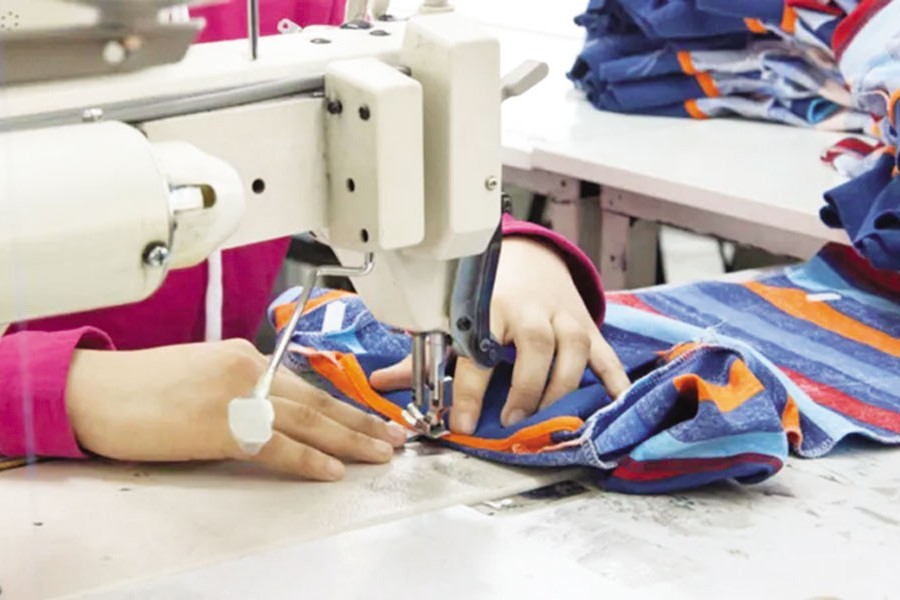Experts and businesses at a discussion on Tuesday suggested a host of measures from innovation to efficient supply chain management and retaining buyers' confidence to face the emerging challenges of the readymade garment (RMG) industry.
They said Bangladesh also needed to focus on other issues including technological upgrade, digitization, skills development of workers, and ensuring transparency, traceability, efficient use of resources, favourable business environment and effective dispute resolution mechanism to cope with the fast-changing global RMG industry.
They made the observations at a session of the third Dhaka Apparel Summit on "RMG Sector Roadmap: Towards a Prosperous Future' held at the International Convention Centre, Basundhara in the city.
The two-day Summit is being held in conjunction with the week-long mega event of "Made in Bangladesh Week 2022".
Moderated by Bangladesh Garment Manufacturers and Exporters Association (BGMEA) vice president Miran Ali, the speakers said the global fashion industry is in the cross-roads and there has always been an urge to make the supply chain responsible, sustainable and transparent.
While sustainability is a key priority, structural shifts in manufacturing and consumption are impacting the global fashion landscape, they noted.
They also recommended adopting innovation, giving priority to circularity, saving water and use of renewable energy.
Taking part in the discussion, Inditex chief sustainability officer Francisco Javier Losada Montero stressed on innovation, technology and digitization, collaboration among all supply chain stakeholders and ensuring traceability and transparency.
Referring to the new regulation of the European Union, he said the legal framework is not the main point but sustainability is, as it is about the climate and social crisis they are facing.
Terming innovation one of the challenges, he said producing recyclable fibre from waste is also an innovation.
"I think Bangladesh is very well positioned to address these points," he said, adding that Bangladesh's graduation to a developing country and the next stage of the fashion industry also has an opportunity to do business in a different way.
Director for Operations at Walmart Sourcing Bangladesh, Rita Lohani said production processes are rapidly changing due to increased connectivity, automation and societal patterns.
She stressed on infrastructural growth in Bangladesh to face the future changes, saying that it is extremely important to speed up connectivity, upskilling the workers, and focusing more on reducing the gap between training and education so that local suppliers can be competitive globally.
Ms Lohani also called for a favourable business environment for multinational companies to continue and ensure foreign investment, dispute resolution mechanism and strong judicial processes.
Kutubuddin Ahmed, former BGMEA president, said entrepreneurs have to be careful about transparency and traceability saying they need to keep records of how much energy they save or the use of chemicals, level of workplace and workers safety.
Speaking at another session about logistics infrastructure, Faisal Samad, a BGMEA director, said some two dozen of the government agencies are looking after the logistics sector and suggested setting up a focal point at the ministry to bring discipline in the sector and reduce logistics cost.
Navidul Huq, BGMEA director, said the logistics cost is very high in Bangladesh.
Bangladesh still largely depends on road connectivity, he said, stressing on rail and river connectivity to save both time and money.
Speaking at the opening session of the Summit, state minister for foreign affairs Shahriar Alam said a mere propaganda is being exercised in recent times that a section of people are investing money abroad for political interest while a quarter appointed lobbyists to suspend GSP facilities for the local RMG in the global market.
Regarding the energy situation, he said the issue would be resolved shortly, maybe within the next three months, as the energy ministry is working on the issue.
Citing the current global economic crisis especially in the energy sector, the Federation of Bangladesh Chambers of Commerce and Industry (FBCCI) president Md. Jashim Uddin stressed the need for improving business forecasting models and risk management for the next 10-20 years.
The RMG industry has matured in almost all aspects of the manufacturing cycle including social and environmental compliances and product designing and innovation.
"All these improvements have increased the cost of production. So from our side, we have a right to expect responsible prices from buyers to share the burden of rising production costs for producing in a safe, secure, compliant, sustainable and environment-friendly manner," he noted.
BGMEA president Faruque Hassan also spoke at the meeting.


